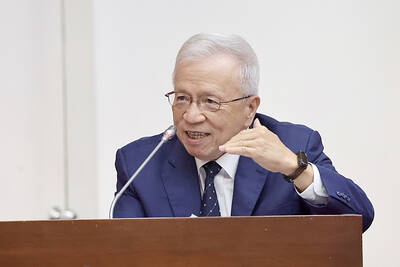American Airlines (AA) is suing Google Inc over the Internet firm's sale of keyword ads for rivals trig-gered by its own trademarks.
A Google visitor who enters certain words or phrases that AA trademarked -- for example, Aadvantage, the name of its frequent-flier program -- will get links to AA's Web site but also its rivals under "sponsored links" -- targeted ads that appear alongside the regular search results.
Google makes most of its money from such keyword ads.
AA filed a lawsuit on Thursday in US District Court seeking unspecified damages.
"When done right, search is a great tool, but we have a problem with this part of their business," AA spokesman Billy Sanez said.
Sanez said the results could confuse consumers and divert customers away from AA's own site.
American Airlines, a unit of AMR Corp, tried to negotiate a settlement with Google before going to court, Sanez said.
Google spokesman Jon Murchinson said the company is "confident that our trademark policy strikes a proper balance between trademark owners' interests and consumer choice, and that our position has been validated by decisions in previous trademark cases."
Similar lawsuits against Google are fairly common, although they tend to involve smaller companies.
More than two years ago, a federal judge ruled in a similar case filed by insurer Geico Inc, ruling that Google's advertising practices were legal. Geico had said Google was letting rival insurance companies pay to have their ads displayed when a user searched for "Geico."
But the judge left the door open for Geico to collect damages from Google for featuring ads that used Geico's name in the text, rather than just using the trademark to trigger the ad. The two settled in 2005.
Google lost cases in France, but has won others in the US.

JITTERS: Nexperia has a 20 percent market share for chips powering simpler features such as window controls, and changing supply chains could take years European carmakers are looking into ways to scratch components made with parts from China, spooked by deepening geopolitical spats playing out through chipmaker Nexperia BV and Beijing’s export controls on rare earths. To protect operations from trade ructions, several automakers are pushing major suppliers to find permanent alternatives to Chinese semiconductors, people familiar with the matter said. The industry is considering broader changes to its supply chain to adapt to shifting geopolitics, Europe’s main suppliers lobby CLEPA head Matthias Zink said. “We had some indications already — questions like: ‘How can you supply me without this dependency on China?’” Zink, who also

At least US$50 million for the freedom of an Emirati sheikh: That is the king’s ransom paid two weeks ago to militants linked to al-Qaeda who are pushing to topple the Malian government and impose Islamic law. Alongside a crippling fuel blockade, the Group for the Support of Islam and Muslims (JNIM) has made kidnapping wealthy foreigners for a ransom a pillar of its strategy of “economic jihad.” Its goal: Oust the junta, which has struggled to contain Mali’s decade-long insurgency since taking power following back-to-back coups in 2020 and 2021, by scaring away investors and paralyzing the west African country’s economy.

BUST FEARS: While a KMT legislator asked if an AI bubble could affect Taiwan, the DGBAS minister said the sector appears on track to continue growing The local property market has cooled down moderately following a series of credit control measures designed to contain speculation, the central bank said yesterday, while remaining tight-lipped about potential rule relaxations. Lawmakers in a meeting of the legislature’s Finance Committee voiced concerns to central bank officials that the credit control measures have adversely affected the government’s tax income and small and medium-sized property developers, with limited positive effects. Housing prices have been climbing since 2016, even when the central bank imposed its first set of control measures in 2020, Chinese Nationalist Party (KMT) Legislator Lo Ting-wei (羅廷瑋) said. “Since the second half of

Taiwan Semiconductor Manufacturing Co (TSMC, 台積電) received about NT$147 billion (US$4.71 billion) in subsidies from the US, Japanese, German and Chinese governments over the past two years for its global expansion. Financial data compiled by the world’s largest contract chipmaker showed the company secured NT$4.77 billion in subsidies from the governments in the third quarter, bringing the total for the first three quarters of the year to about NT$71.9 billion. Along with the NT$75.16 billion in financial aid TSMC received last year, the chipmaker obtained NT$147 billion in subsidies in almost two years, the data showed. The subsidies received by its subsidiaries —